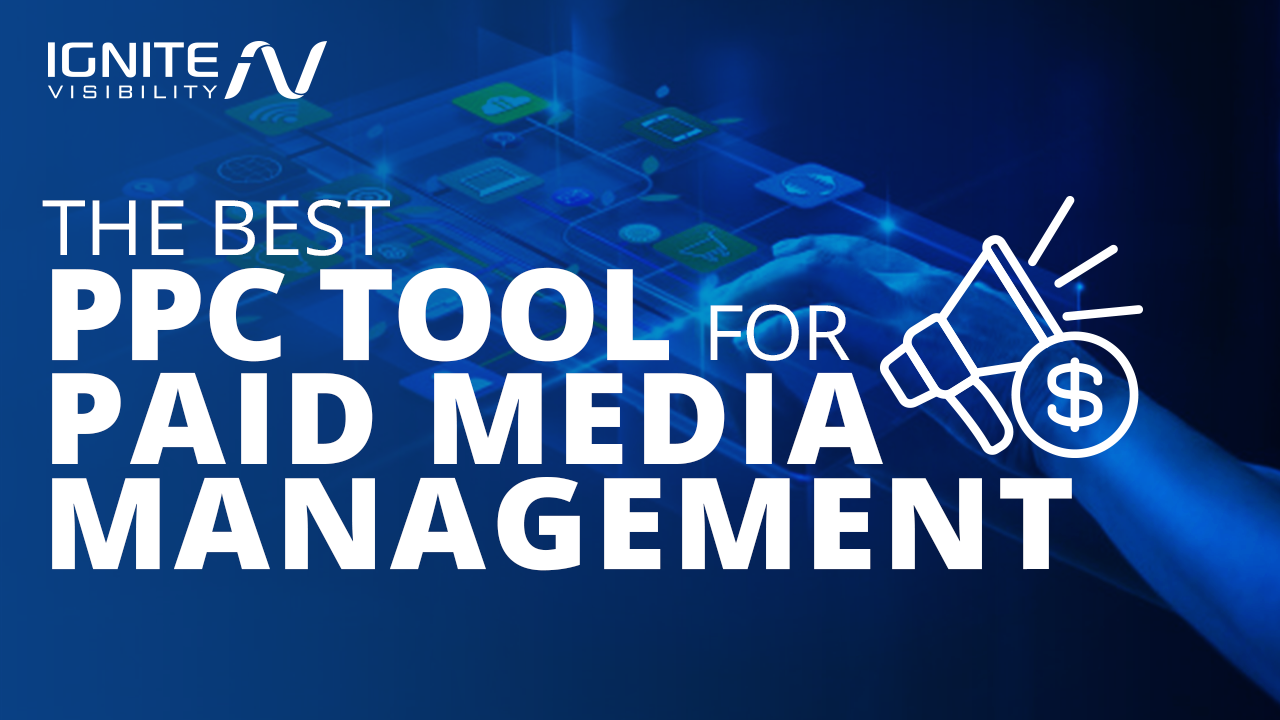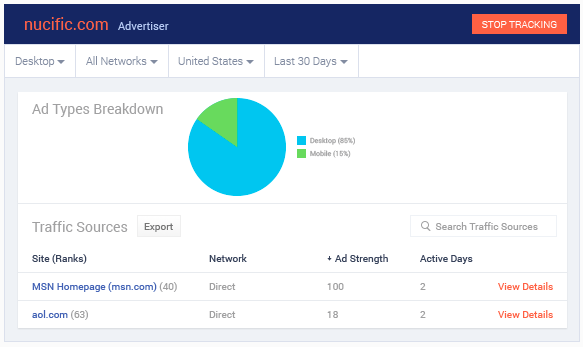Want to make the most out of your PPC campaign?
Then you need a few tools to help you do it.
In this article, I’ll list some of the top PPC tools on the market to help you create, manage, and optimize your campaigns.
What We’ll Cover:
- Account Management & Optimization Tools:
- PPC Keyword Research Tools
- Competitor Research Tools
- Landing Page Optimization Tools:
- Retargeting Tools:
- PPC Protection:
Account Management and Optimization Tools
1. Google AdWords
Chances are, you’re already using this.
Google AdWords Editor is your one-stop-shop for managing all things Google PPC-related, and its impressive array of tools makes it no wonder it’s consistently the best in the biz.
From creating and running ads to optimizing and gathering data AdWords is a tool every marketer should be using to manage their campaigns, and where most start when breaking into PPC.
2. Bing Ads Editor
Bing Ads Editor is one of the PPC management tools similar to AdWords, except, of course, it’s geared towards Bing users.
I’ve made the case before for why you should be using Bing Ads, and Bing Ads Editor goes hand in hand.
With it, you can sync your campaigns and accounts, make edits in bulk, and manage multiple accounts.
Again, it’s AdWords for Bing, and it’s a must for PPC.
3. Optmyzr
Opytmyzr is a really cool tool for anyone managing both AdWords and Bing accounts.
Its biggest claim to fame is its one-click optimization tool. For example, if it recommends that you should be bidding higher on a specific set of keywords, you can adjust the bid to the recommended amount in one click.
Here are some of the other benefits of Optymyzr:
- Data extraction. Although there’s a ton of data that you could extract from Google Ads and Bing Ads, it would require quite a bit of effort to aggregate it, parse it, and analyze it. Optymyzr streamlines that process so you can focus on getting the most out of your ad campaigns.
- Deeper insights. Optymyzr gives you the ability to run the same analysis on different market segments. That empowers you to gather data that you can use for highly targeted campaigns in the future.
- Are you sick of poring over spreadsheets, crunching numbers manually, and copying data from one tool to the next? If so, Optymyzr can help because it gathers data from different sources, analyzes it with artificial intelligence, and presents the results in a way that’s easy to read.
Clearly, it’s a time-saver, but you’ll still need to use discretion when applying the tool. And keep in mind, the tool runs at $250/month, which may a bit pricey for some smaller businesses.
4. Wordstream Advisor
Wordstream is one of the PPC management tools aimed primarily at small and medium-sized businesses.
Wordstream Advisor, integrates with AdWords, Bing, Facebook, and Instagram.
One of its bigger features is what it calls the 20 Minute Work Week, a workflow that consists of 9 items to help you improve your accounts. Those items include one-click optimizations and account suggestions.
Beyond that, Wordstream Advisor will help you manage your campaigns across platforms and conduct search query analysis.
5. AdEspresso
PPC isn’t all about search engines. As most savvy marketers know, social channels – and Facebook especially – is huge on the PPC scene.
AdEspresso helps you manage and optimize your Facebook campaigns.
It’s easy to set up and helps you manage and analyze all campaigns specifically for the channel.
In fact, you can use AdEspresso to streamline campaign management across multiple channels, including Google Ads and Instagram as well as Facebook.
If you’re tired of switching from one ad manager to the next, and you advertise on those three channels, you should take a good look at AdEspresseo.
Check it out with a free 14-day trial; after that, pricing begins at $49/month.
6. AdStage
AdStage collects all your advertising data in one platform, where advertisers can quickly view and analyze the effectiveness of each campaign.
The AdStage data suite is comprised of three products: Report, Automate, and Data API.
With all three, you can easily visualize and automate your campaigns.
For more information, check out the products here.
7. AdScale
AdScale is an AI-based platform that automates and optimizes Google Search, Display, YouTube, and Shopping campaigns. Some people think it’s the best PPC tool.
It claims to boost performance while reducing 80% of optimization time, while allowing you to identify and retarget the right audience across any device.
AdHawk is one of the easiest ways to manage your AdWords and Facebook campaigns.
The software, built by two ex-Google employees, is divided into three categories.
The first, AdHawk Assistant, gives you optimization software for AdWords and Facebook.
The second, AdHawk Managed Services, provides dedicated account management for all your campaigns.
The last, AdHawk for Agencies, provides reporting and optimization tools for small and medium sized business.
To learn more about which is right for you, visit their site here.
9. Tenscores
Tenscores is PPC management software that approaches optimization a little differently.
Mainly, it focuses specifically on improving your Google Ads Quality Score. To do so, it provides detailed recommendations on the keyword, ad group, and campaign level.
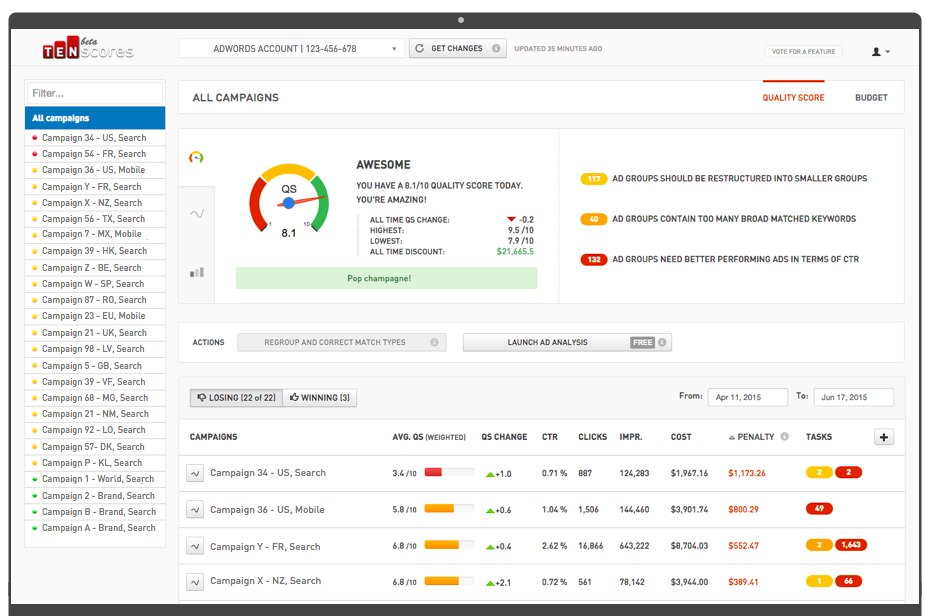
Tenscores
Those recommendations can be applied right through the tool with Tenscores automatic restructuring feature.
Intrigued? You can sign up for a free 14-day trial here.
Keyword Research Tools
10. SEMRush
SEMRush is one of my favorite tools for SEO and PPC.
It’s excellent for keyword research; just type any keyword into the search bar, select Keyword Overview, and it will pull lists of phrase match keywords, related keywords, organic searches, and ad copy using the keyword.
And that’s really just the tip of the iceberg.
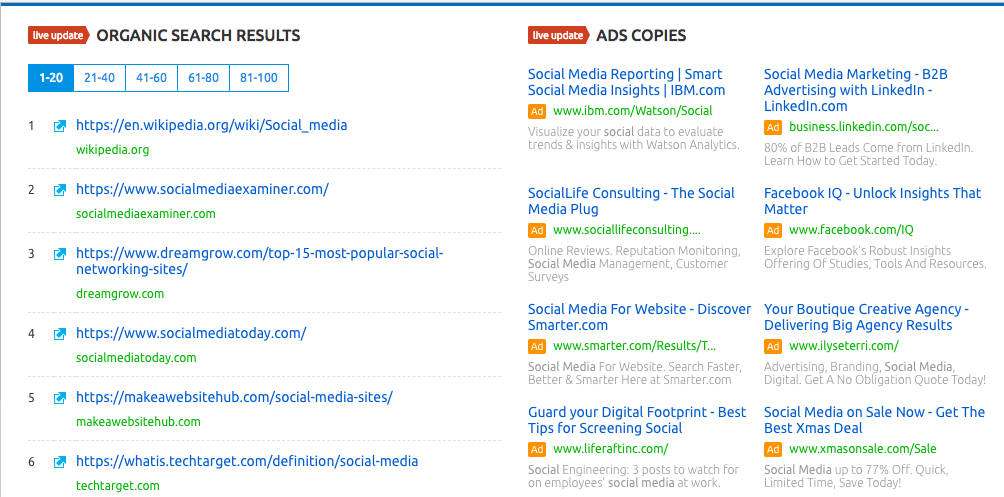
SEMRush
SEMRush is also a super handy competitor research tool (more on those in a minute.) With it, you can find detailed information on organic and paid traffic, top keywords they bid on, and advertising copy.
SEMRush offers a free 14-day trial. After that, plans start at $99/month.
11. Google Keyword Planner
Chances are, you’re already using Google Keyword Planner.
And while it’s essential for overall SEO, it’s equally useful when it comes to building an effective PPC campaign.

Google Keyword Planner
Simply put, it helps you target the right customers with the right keywords.
Plan it well, and you get the best keywords for the best price. In short, it’s a must.
12. Keywordtool.io
This is cool PPC management software that, like most keyword tools, will pull a giant list of keywords related to one you type in.
But beyond that, Keywordtool.io will tell you each keywords search volume (the average number of times people search per month), trend (how search volume has changed over 12 months, CPC (avg. amount advertisers are bidding), and the competition (number of advertisers bidding).
You can also search based on which channel you’ll be using: YouTube, Amazon, Google, Bing, or Instagram.
To unlock the more advanced features, you’ll need a subscription plan. These start at $48/month.
13. Google Trends for SEO
At first glance, this one may seem pretty similar to Google Keyword Planner.
But Google Trends returns results based on search trends, which can be incredibly useful for PPC campaigns.
For example, this Google tool will highlight and suggest new keywords based on any recent rises in demand. You can also view interest over time and interest by region and subregion.
This is an especially useful tool if you happen to run any seasonal campaigns and need to choose keywords that peak at certain times throughout the years.
14. Answer the Public
I’m a big fan of this one.
While it functions like a normal keyword tool, Answer the Public focuses on actual search queries and related questions.
Basically, instead of just entering a keyword, you enter a question related to that keyword. Answer the Public will pull a list of related questions – which is incredibly useful for finding long tail keywords and questions people are actually searching for.
More than just keywords, this insight will give you some great ideas about what to include in the ad copy itself.
Competitor Research Tools
15. SpyFu
SpyFu is an extremely popular tool used to do advanced competitor research.
Specifically, it will show you the keywords your competitors are using and how much they’re bidding on them.
And by that I mean every keyword they’ve ever bought on AdWords (ones you haven’t bought yet), every organic rank, and every ad variation they’ve run over the past 12 years.
That’s some pretty serious spy work, and it can be extremely beneficial in reverse engineering your competitor’s strategy.
SpyFu pricing starts at $39/month.
16. PPC Tool: iSpionage
iSpionage is another tool aimed at helping you steal your competitor’s traffic.
By entering in a competitor’s URL, iSpionage will return entire lists of keywords and the monthly spend on each.
iSpionage will give you some information for free, but the basic plan starts at only $29/month.
17. Moat Pro
Moat Pro is a good tool if you want to do some digging into your competitor’s display ads.
It allows you to run free searches and pull a library of your competitors display or video ads , and, and its advanced tool will notify you if it detects any sudden shifts in ad spend.
And one of its best features is its mock up tool, which allows you to see what your ad creative would look like on any given page.
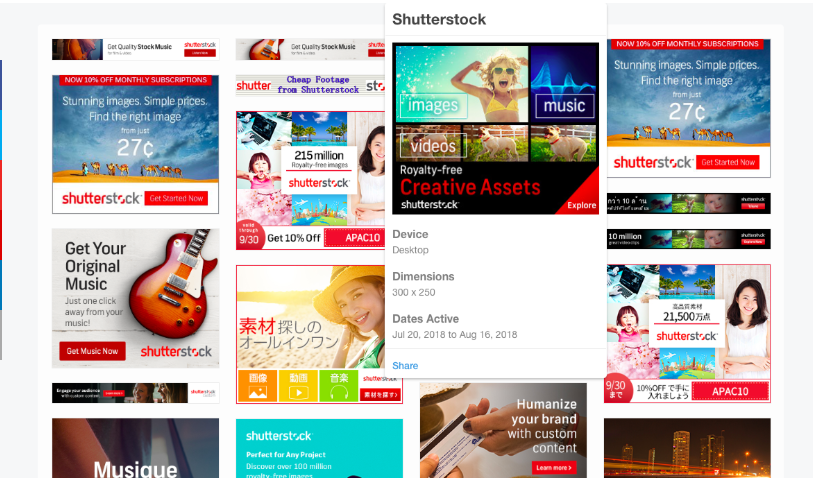
PPC Tools: Moat Pro
If this sounds like the tool for you, you can request a free demo at the bottom of the homepage.
18. AdBeat
AdBeat is another comprehensive tool aimed at display ads.
A simple search for any competitor will show results on how many ads have been seen this month, which channels (direct, native, or programmatic) and what creatives were most effective.
You can also take a look at their “Top Ads” section to see what the most successful ads look like, and use its “Advertiser Compare Tool” to compare two different advertiser’s ad impact.
AdBeat pricing starts at $249/month.
19. PPC Tools: Campaign Watch
Campaign Watch is another advanced competitor analysis tool that lets you monitor your top competitors seasonal spend, clicks, position, number of keywords, and market share across desktop and mobile devices.
Additionally, you can monitor competitor landing page tests and results, as well as perform user conversion funnel comparisons to see which ad experience has the most compelling offers for users.
Of course, that’s on top of its keyword analysis and industry comparison features.
For more information on the product and pricing, contact Campaign Watch.
20. WhatRunsWhere
WhatRunsWhere does a lot of the same things as the tools above, with an emphasis on competitive creative analysis.
With it, you can see what kinds of ads your competitors are running and where, see which ads are running on a particular domain, and which specific keywords they’re running.
Pricing plans start at $299/month.
Landing Page Optimization Tools
21. Unbounce
A solid landing page is a crucial part of the PPC process.
After all, your ad will get them there, but the landing page is where the conversions happen.
So build a great one with tools designed to help you do so, like Unbounce.
Unbounce was the first landing-page centric software to hit the market, and comes with an array of cool features like dynamic text replacement (which automatically swaps out keywords to match what a user searched for), A/B testing and targeted pop-ups.
Unbounce offers a 30-day trial, and pricing starts at $99/month.
22. PPC Tools: Instapage
Instapage is all focused on all things landing page related.
One of it’s biggest benefits is its impressive array of templates and Pixel Perfect drag-and-drop editor, which lets you place elements anywhere on a page, without the unwanted guidance of pre-designed boxes.
It also comes with its own built-in analytics which allows you to set and track specific conversion goals.
After a free 14-day trial, Instapage pricing starts at $79/month.
23. Leadpages
Leadpages is one of the leaders in the landing page space, thanks in part to its two landing page editors designed bases on a user’s comfortability with landing page creation.
It also offers advanced widgets like checkouts, which lets visitors checkout right from a leadbox (Leadpages speak for pop-ups), and countdown timers.
Leadpages pricing starts at $37/month.
PPC Tools: Retargeting
24. AdRoll
In the ever-growing world of PPC, emerging trends are quickly gaining their very own tools.
Case in point: remarketing.
It’s an essential step in a successful PPC campaign, and made much easier with the help of tools like AdRoll.
AdRoll will sync your campaigns to amp up your revenue and help better personalize the customer experience.
For more information on pricing and sign-up, head over to the AdRoll website.
25. PPC Tools: Perfect Audience
Perfect Audience is another PPC tool designed to help specifically with remarketing.
It helps with mobile, dynamic, web, and Facebook retargeting.
Special features include the ability to blacklist sites that aren’t converting, help building UTM parameters, and advanced audience segmentation options including by pages or URLs visited, emails opened, words in the URL querystring, etc.
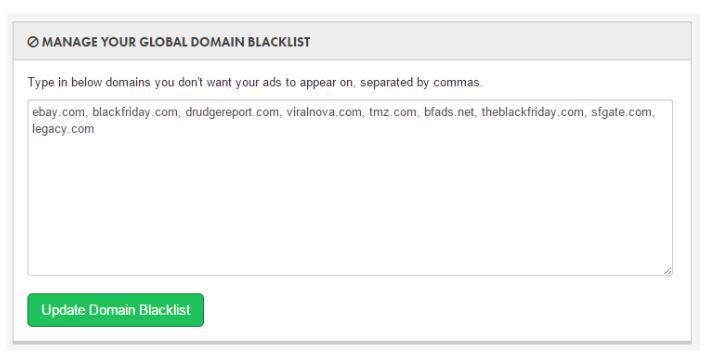
PPC Tools: Perfect Audience
Perfect Audience offers a free 14-day trial.
PPC Protection
26. PPC Tools: PPC Protect
This one is unique on the list in that it helps you protect your PPC campaign from click fraud.
For those unfamiliar, Wikipedia defines click fraud as “Fraud that occurs when a person, automated script or computer program imitates a legitimate user of a web browser, clicking on such an ad without having an actual interest in the target of the ad’s link.”
And according to PPC Protect, click fraud cost was estimated to cost advertisers over $16 billion in 2017.
Which is exactly why a tool like this comes into play.
PPC Protect’s automated software is designed to identify and stop this kind of fraud and protect your budget from useless clicks.
A free 30-day trial is offered, and pricing starts at $29/month.
Concluding PPC Tools
There’s a lot of PPC tools out there, and each are designed for different purposes.
Some will help with keywords. Others are designed to give your a competitive edge. And still, more have very specific purposes like remarketing optimization.
Hopefully, you have a better idea of some of the top tools out there and which can best fit your business needs.

